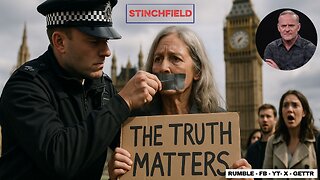Premium Only Content

Speech cannot be compelled – SCOTUS
Speech cannot be compelled – SCOTUS
By Terry A. Hurlbut
Yesterday the U.S. Supreme Court handed down a decision in the last of its Big Cases for the 2022 Term. In 303 Creative LLC v. Elenis, 600 U.S. ____ (2023), the Court held that no government may compel someone to speak against one’s deeply held beliefs. That holds even against any consideration of “public accommodation.” But almost as important as the holding, are the attitudes of members of the Liberal Bloc of the Court. The 70-page “slip opinion,” consisting of the opinion of the court and one dissent, could be the most vituperative exchange in the annals of the Supreme Court. Together with the opinion and dissent in Biden v. Nebraska, it could represent a new low in Court relations.
Free speech meets public accommodation
Lorie Smith owns and runs 303 Creative LLC, a web design business. Lately she decided she wanted to design Web sites for weddings, and to tell the story of each. But she has a problem. As a resident of Colorado, she is subject to the Colorado Anti-Discrimination Act, or CADA. CADA is one of many laws States have made to forbid discrimination in places of public accommodation. On its face, the idea seems noble, and even has a long tradition in common law. Certain businesses – especially hospitality, transportation, and communication – do not have “the right to refuse service to anyone.” As a corollary, Colorado’s law forbids any business to post any sign or other written notice of refusal of service to members of particular groups.
Title II of the Civil Rights Act of 1964 is a public accommodation law applicable throughout the country. Under it, no operator of a public accommodation may discriminate on race, color, religion, or national origin. Title II seems to limit public accommodation to the hotel, restaurant, and “exhibition and entertainment” industries. That last would include movie houses, theaters, concert halls, sports arenas, stadiums, and, presumably, theme parks. In short, Title II covers all the places once subject to Jim Crow laws.
But CADA goes further than the tradition of public accommodation provides. It applies to absolutely any business or practice selling any good or service other than through strictly private sales. And: it adds “sexual orientation” to the non-discrimination list.
What might she face?
Therein lies the rub. Lorie Smith is a sincere Christian, and, per the Bible, no two persons of the same sex may properly marry. (See Romans; see also I Corinthians 5.) So she hasn’t yet implemented her wedding site plans. Because as soon as she does, Colorado’s Civil Rights Commission will force her to handle same-sex “weddings.” If she refuses, she faces penalties, including $500 fines, mandatory “sensitivity training” sessions and never-ending compliance reporting requirements.
So, to see to the protection of her First Amendment speech rights, she sued Colorado, seeking to enjoin that law. (Or at least, to enjoin its application to her and her business.) One particular case that caught her eye: Masterpiece Cakeshop Ltd. v. Colorado Civil Rights Comm., 584 U.S. ____ (2018).
Anthony Kennedy was on the Court then, and delivered the opinion of the Court. The Court held, 7-2, that even an “unexceptional” public accommodation law that protects alternative-lifestyle adherents, cannot impose on someone’s religion. The Free Exercise Clause of the First Amendment was the controlling one.
And who were the two dissenter? Ruth Bader Ginsburg – and Sonia Sotomayor. Elena Kagan and Stephen Breyer actually joined Justice Kennedy’s majority opinion.
So Smith sued in federal court – and lost, both at trial and on appeal (to the Tenth Circuit). The three-judge panel that heard her case voted 2-1 against her – but the Chief Judge of the court dissented.
He observed that “ensuring access to a particular person’s” voice, expression, or artistic talent has never qualified as “a compelling state interest” under this Court’s precedents…. Nor, he submitted, should courts depart from those precedents now. “Taken to its logical end,” Chief Judge Tymkovich warned, his colleagues’ approach would permit the government to “regulate the messages communicated by all artists”—a result he called “unprecedented.”
The First Amendment and what it protects
Neil Gorsuch delivered the opinion of the Court. Chief Justice John Roberts and Justices Samuel A. Alito, Amy Coney Barrett, Brett Kavanaugh and Clarence Thomas joined. Sonia Sotomayor wrote the dissent, in which Ketanji Brown Jackson and Elena Kagan joined. None of the Justice wrote any concurrences.
Gorsuch probably couldn’t have chosen any more provocative mix of authorities than he chose:
• Boy Scouts of America v. Dale, 530 U.S. 640 (2000). This case involved the hiring of gay Scoutmaters and Assistant Scoutmasters.
• Hurley v. Irish-American GLB Group of Boston, 515 U.S. 557 (1995). The local “gay talent” wanted to march in the St. Patrick’s Day Parade in Boston, Massachusetts. The Supreme Court held that the parade was protected speech, and its organizers had the right to say who would, and who would not, march in it.
All of which to say: the Supreme Court has a history of protecting expressive speech even in “public accommodation” contexts. And even against alternative-lifestyle adherents and practitioners.
With that in mind: the Tenth Circuit already conceded that the web sites Smith proposed to create were pure speech. And not only speech but her speech. They had to: both plaintiff-appellant and defendant-respondent had so stipulated.
The difference is that the Tenth Circuit found a “compelling interest” in making all goods and services available to all. But the Dale and Hurley cases say otherwise.
The State tried to deny that speech was involved!
Gorsuch then turned to the State’s briefs. Though the Tenth Circuit found that the wedding web sites would constitute speech, now the State tried to deny that. In short, they said that a web site was an ordinary service, of which speech was not an essential element.
The problem is: both parties have stipulated that creating the site does involve speech. Lorie Smith does not propose merely to provide templates and let the clients fill these in with their own prose. She proposes to write the scripts as well as providing a layout and other infrastructure. The State knew that in their response to the Tenth Circuit. Changing one’s theory of response (to appeal or cert petition) is never a good idea.
Next, the State apparently tried to make Lorie Smith out to be a bigot. Again, said Gorsuch, the stipulations said otherwise. Among them: she would gladly provide services even to alternative-lifestyle adherents to deliver messages other than weddings.
Last, the State tried to bring up a case the Justices had already dealt with at oral argument. Rumsfeld v. FAIR, 547 U.S. 47 (2006). A military recruited wanted a room to hold recruitment. The Forum for Academic and Institutional Rights refused. And the Supreme Court said Congress had the right to withhold federal funds by reason of that refusal. The only “expression” required of anyone was to post notice of time and place of the recruitment period.
Gorsuch concludes
Summing up, Gorsuch said Colorado intends no mere incidental abridgment of the freedom of speech. They seek to force someone to deliver speech to which she objects, that goes far behind advertising or meeting notices.
Again, Gorsuch had at least two cases on point to cite as precedents. These were the Boy Scouts and St. Patrick’s Day Parade cases.
Bear that in mind when reading Sonia Sotomayor’s dissent. She starts by dissembling on what Masterpiece Cakeshop means. If one read only her dissent and not the case itself, one might think Masterpiece Cakeshop lost.
Then she opens her second paragraph thus:
Today, the Court, for the first time in its history, grants a business open to the public a constitutional right to refuse to serve members of a protected class.
What!? Who said anything about refusing service? All 303 Creative proposes is to decline to offer one particular kind of service. That’s not the same as refusing to do anything for members of any group. And “for the first time in its history”? Well, of course, she would have you believe Masterpiece Cakeshop lost their case. And maybe that the Boy Scout and St. Patrick’s Day Parade cases never happened. (Or is it just that the Boy Scouts and the parade organizers were non-profit organizations? That’s a distinction without a difference.)
“What a difference five years makes,” she says next – again, as if to say Masterpiece Cakeshop lost. But that’s not all: she lifted that quote from her dissent in Carson v. Makin, 596 U.S. ____ (2022). From freedom of speech to free exercise of religion, to both of which she objects, is quite a leap.
The real issue: some think speech should be limited
Her dissent continues along that same line. Aside from statements contrary to fact, Sotomayor insists that speech for pay loses all protection. She also speaks of a “capacity to evolve,” meaning to redefine “public accommodation” according to ever shifting ideas of justice.
That is not a republican principle. A republic depends on immutable principles of law. So she cannot invoke common law, as she does, then twist it into a shape the original framers of that common law would never conceive.
Her conflation of respect for freedom of speech for heterosexual Christians, with the arguable disrespect for liberty that (some say) was the police raid on the Stonewall In in Greenwich Village, New York, in 1969, takes one’s breath away. As one reads on, the thrust of her argument becomes abundantly clear. No person, not a member of a “protected class,” has any rights that members of that class need respect.
If the learned Justice cares to dispute this characterization, CNAV challenges her to apply to Meta, Inc. (Facebook and Instagram), Twitter (pre-Musk), and Alphabet, Inc. (Google, YouTube) the same reasoning she applies now to 303 Creative LLC. We predict that when (not if) Missouri v. Biden comes before the Court, she will vote to deny the plaintiffs any relief. Her objection is ideological, not according to any principle.
But this should surprise no one. During oral argument, Sotomayor repeatedly equated sexual orientation – a choice – with race – an immutable characteristic.
But does petitioner retain the right to decide on message?
This statement in the dissent is especially mysterious:
[E]ven if the company offers its goods or services to the public, it remains free under state law to decide what messages to include or not to include. To repeat (because it escapes the majority): The company can put whatever “harmful” or “low-value” speech it wants on its websites. It can “tell people what they do not want to hear.” All the company may not do is offer wedding websites to the public yet refuse those same websites to gay and lesbian couples.
First, as Gorsuch observes: if 303 Creative could decide what messages to include – or not – then we have no debate. But they can’t, and Sotomayor knows they can’t. The client must approve of the message. Moreover, the message is as much a part of a 303 Creative website as is its code, images, scripts, etc. They do not propose to offer a mere template, but a finished work.
And on that same page, Sotomayor wants to forbid what her ideological allies on many social media platforms practice today. Here CNAV repeats its challenge. Let’s see what she has to say when Missouri v. Biden comes to the Court.
Summing up
Neil Gorsuch is only half right when he criticizes Sotomayor for “refus[ing] to acknowledge where [her] reasoning leads.” Doubtless he knows that, in the Sotomayor world, no State would, or could, make or enforce a law enforcing a grant of the allowance (not right) she has created for alternative-lifestyle practitioners, to those opposed to the alternative-lifestyle message or “community.” In fact he corrects himself:
Perhaps [Justice Sotomayor] finds these possibilities untroubling because [she] trusts state governments to coerce only “enlightened” speech. But if that is the calculation, it is a dangerous one indeed.
And how. But that is the precise calculation of the political left.
Actually the final vote surprised CNAV. We expected Chief Justice Roberts to concur in the judgment, as he did in Dobbs v. Jackson Women’s. Instead he joined Neil Gorsuch’s opinion and wrote no concurrence at all.
So Lorie Smith has won her injunction. But once again, Sonia Sotomayor has engaged in conduct unbecoming a Justice of the Supreme Court. She did this once before, in a 2014 case. Back then, The Atlantic wondered at the apparent new depth of Court invective. What they must think of her dissent today is impossible to imagine. Then again, witness her incredible behavior at oral argument in a vaccine mandate case. Incredible, not only for breaches of etiquette but for asserting “facts” manifestly not in evidence.
Elections, especially Presidential ones, have consequences – and particularly for the branch designed to rein in the worse excesses of the other two.
Link to:
The article:
https://cnav.news/2023/07/01/editorial/talk/speech-cannot-compelled-scotus/
The opinion:
https://www.supremecourt.gov/opinions/22pdf/21-476_c185.pdf
The authorities:
Masterpiece Cakeshop:
https://www.supremecourt.gov/opinions/17pdf/16-111_new2_22p3.pdf
Boy Scouts:
https://supreme.justia.com/cases/federal/us/530/640/
St. Patrick’s Day Parade:
https://supreme.justia.com/cases/federal/us/515/557/
Rumsfeld v. FAIR:
https://supreme.justia.com/cases/federal/us/547/47/
Carson v. Makin:
https://cnav.news/2022/06/22/foundation/constitution/supreme-court-repudiates-blaine/
Declarations of Truth Twitter feed:
https://twitter.com/DecTruth
Conservative News and Views:
https://cnav.news/
The CNAV Store:
https://cnav.store/
Our Silver Lines
https://oursilverlines.com/
-
 16:20
16:20
Declarations of Truth
6 months agoAOC for President of Earth
2381 -
 LIVE
LIVE
The Charlie Kirk Show
31 minutes agoMark Kelly Court Martial + AI Embargo + Thanksgiving | Davis, Federer, Newcombe | 11.25.2025
2,502 watching -
 53:20
53:20
The Rubin Report
1 hour agoLara Trump Destroys Bill Maher’s Narrative w/ Facts in 1 Minute
3.44K13 -
 LIVE
LIVE
LFA TV
14 hours agoLIVE & BREAKING NEWS! | TUESDAY 11/25/25
3,970 watching -
 1:08:44
1:08:44
VINCE
4 hours agoThe Deep State Strikes Back! (Guest Host Shawn Farash) | Episode 176 - 11/25/25 VINCE
153K87 -
 DVR
DVR
Benny Johnson
2 hours agoIt's All True, The 2024 Election Was Ready To Be Rigged. The REAL Story of How Trump-Elon STOPPED It
25.9K46 -
 LIVE
LIVE
The Mel K Show
1 hour agoMORNINGS WITH MEL K - A Republic.. If You Can Keep It! 11-25-25
669 watching -
 LIVE
LIVE
The Shannon Joy Show
1 hour agoDOGE Is DEAD * Trump’s Golden Economy Implodes * LIVE Exclusive With Galileyo CEO Brett Miller
169 watching -
 LIVE
LIVE
Grant Stinchfield
18 hours agoFree Speech DEAD in Britain: Islamic Migrant Chaos Sparks Police Crackdown on the Law Abiding!
129 watching -
 LIVE
LIVE
Daniel Davis Deep Dive
2 hours agoCol Doug Macgregor: Ukraine Russia Peace Proposal Moscow Awaits Official Version
109 watching